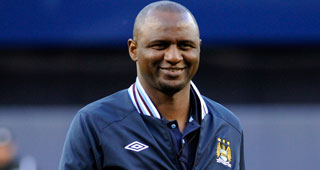Jason Kreis left Real Salt Lake for NYCFC in 2013 to embark on a soccer boot camp, absorbing the Manchester Way a full year before the side even had a roster. Kreis was tasked with shaping the MLS side of Manchester City’s project defined by a holistic approach to “play the same way” at every iteration from the first team on down. And it only took one season, and a woefully imbalanced midfield and defense, for Kreis to get fired. Granted, with the shape of their roster, success would have been impossible for even the best of managers.
There were rumblings throughout the season, but the decision to part ways with Kreis was a surprise due to the high esteem he’s accrued over his success at RSL. He had earned the benefit of time to figure things out. Then, NYCFC topped that surprise by naming Patrick Vieira as his managerial replacement.
It was a confusing appointment on the surface. Vieira was supposedly groomed for the top position at City, and his time in the MLS may not have much implication on how good of a manager he could be in Europe. Grant Wahl espoused the idea of the MLS being the most “Moneyball” oriented league in The Beckham Experiment, in which he asked the “to be or not to be” question that hangs over the MLS: with a salary cap, is it better to have a one or two millionaire superstars surrounded with little depth, or is it more effective to have a team of good players with six figure salaries but no superstars?
The rhetorical question appears to have an answer. The four teams in this year’s MLS conference finals (FC Dallas, Portland Timbers, NY Red Bulls, Columbus Crew) lay bare the skeleton of a successful, sustainable MLS side. Matt Doyle predicts that teams will spend their time and resources scouting non-superstars as “that’s where the wins are”. Landon Donovan sees a future away from high priced Designated Players (another quirk of MLS that Vieira will have to see through). Clint Dempsey makes more money than the FC Dallas roster combined - yet with their highly acclaimed youth academy, Dallas defeated the Sounders on penalty kicks to make the conference finals.
This is the fundamental idea of MLS team building that Vieira and NYCFC must create their foundation upon. Kreis built his Real Salt Lake mini-dynasty on the middle class players who “make a difference between winning and losing”, and no coach outside of Bruce Arena or Peter Vermes gets more from this type of player (Kreis also made the point that he developed Kyle Beckerman and Nick Rimando into national team players at RSL as opposed to buying them). Timbers striker Fanendo Adi and defender Nat Borchers both note the importance of locker room chemistry, as well as the importance of depth in dealing with injuries from the season. While Andrea Pirlo, Frank Lampard, Mix Diskerud and David Villa are as good as any four teammates in the league, letting in 58 goals in 34 matches will get a coach fired every season.
Wahl also recounts Ruud Gullit’s turbulent time as LA Galaxy manager, and Vieira will surely have studied where he went wrong. Gullit was accustomed to the freedom of European leagues where he could buy any player at any time. He never adjusted to the idea of a playoff system. For his time, he was named the worst coach in MLS history.
Looking back, Gullit’s experience represent a turning point in the league. While big signings persisted on the field, teams placed an emphasis on coaches who could navigate the unique terrain of the league. The grandeur of NYCFC’s approach last season represented a throwback to this earlier period of the league when teams modeled their approach off European clubs. The lesson? The laws of MLS gravity can’t be changed with money.
---
As a player, Patrick Vieira could do everything - defend, tackle, pass, attack, run, score, or get a red card. He was both the heart and muscle of Arsenal’s midfield during the Invincibles run. But he still was probably underappreciated as he just so happened to play on the most entertaining team of the last decade, featuring two artists in Thierry Henry and Dennis Bergkamp who were quick to turn a player and score individual goals in case anyone outside the game would dare forget about them.
Vieira’s importance as a player is seen in his influence. Take a look at the amount of players labeled as the next Vieira, for one. His battles with Roy Keane were epic enough to become a documentary. If there is one mentality that Arsenal fans clamor for more than any to add to their current side, it is Vieira.
It was widely thought he would replace Manuel Pellegrini after managing the reserve side in a similar organizational movement to Pep Guardiola and Filippo Inzaghi. But Vieira was part of the backroom staff that developed the Manchester Way, and knows its processes as intimately as any. For the immediate future, Vieira must solve the midfield balance between Pirlo and Frank Lampard that plagued Kreis all season (the perfect player to stitch it all together would have been himself, 20 years younger).
Vieira lists his coaching influences as a combination of Jose Mourinho, Fabio Capello and Arsene Wenger, which is like The Beatles, The Rolling Stones and The Beach Boys influencing your band. Wenger, with his own personal style of Premier League Moneyball, would be the most appropriate reference (Wenger would do well in MLS). He joins Dennis Bergkamp, Marc Overmars and Thierry Henry from those famous Arsenal side in the coaching ranks, but under vastly different circumstances. To find success at NYCFC, he doesn’t need to find the “the next Vieira” - developing a group of cost effective players will do just fine.



